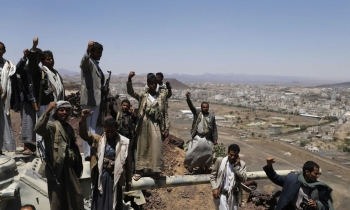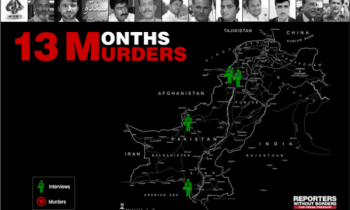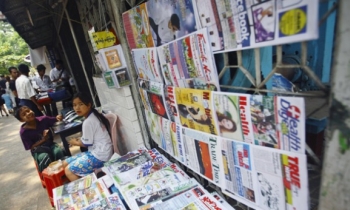BAGHDAD, Iraq, Jan. 22 - The tools of her trade were a notebook, pen, Islamic head covering and Arabic name to pass unnoticed through Iraqi streets.
Together with an interpreter and a driver, Jill Carroll, a 28-year-old American journalist, was able to slip quietly inside Iraqi society, telling stories about the lives of the Iraqis she met.
But on the morning of Jan. 7, Ms. Carroll was kidnapped, seized by gunmen in Baghdad who blocked her car and killed her interpreter as he tried to call for help.
Now her threadbare room in an inexpensive hotel here is the command center that other reporters are using to try to secure her release.
The seizure of Ms. Carroll, whose image from a video with armed men at her side is now familiar in many American households, has underscored the risks to foreigners of working here, particularly freelance journalists, who operate with little or no protection.
When Ms. Carroll arrived in 2003 - fresh from Arabic lessons and a job at an English-language newspaper in Jordan - Iraq was wide open. Journalists drove around in their own cars, talking to Iraqis as they emerged in a daze from cramped lives under Saddam Hussein.
"You were eating at restaurants," said Ashraf Khalil, a reporter for The Los Angeles Times who was working in Iraq as a freelancer at the time and knows Ms. Carroll. "You were hailing cabs at night. You were speaking English on the street."
Freelancing was not easy. Mr. Khalil described how Ms. Carroll and he discovered a $5 special of Middle Eastern salad and a hard boiled egg with beef at a nearby hotel. Her hotel, the Musafir, was one of the cheapest frequented by Western reporters: two-room suites were shared for $30 per person per night.
But Ms. Carroll, who graduated from the University of Massachusetts in 1999 with a bachelor's degree in journalism, was glad for the chance to work on such a big story.
She described the motivation in an article for The American Journalism Review published last year. "The cubicle walls are closing in," she wrote. "You'd rather jump off a cliff than cover one more zoning board meeting and just when one of the biggest stories in years is developing in Iraq, those foreign correspondent aspirations seem ever further out of reach."
"There's only one way out," Ms. Carroll wrote. "Pull up stakes, clean out that savings account and get on a plane to Baghdad."
As a woman, Ms. Carroll had a special advantage. She could dress in the Islamic head covering, a hijab, and the long black cloak, the abaya, and move around Baghdad's streets relatively unnoticed. Women who were reporters often saw themselves as less vulnerable to kidnappings than their male colleagues, partly because of the disguise afforded by Iraqi dress.
"We can put on our scarves and abayas," said Jackie Spinner, a reporter for The Washington Post. "She felt that it was an extra security blanket. I definitely felt that way."
Ms. Carroll got to know the story well. She went into Iraqi homes. She shopped for clothes in Baghdad. She used her Arabic and went by the name Zaineb.
As the months passed, Baghdad became increasingly dangerous, and news organizations began to require reporters to travel with two cars - a passenger car and a backup or "chase" car - and armed guards. In September 2004, two American engineers and a Briton were kidnapped and beheaded. A month later, a British-Iraqi aid official and longtime Baghdad resident, Margaret Hassan, was kidnapped and later killed.
But Ms. Carroll, who had begun to write regularly for The Christian Science Monitor, continued to work with her small team. She wrote in her Journalism Review article that it seemed safer that way.
It is still unclear precisely what happened on Jan. 7. At least one witness said the kidnappers mistakenly drove down a dead-end street, suggesting that the seizure was not well planned and that another car could have helped stop them.
In Iraq, danger presents itself on a daily basis, and the taking of Ms. Carroll, who was described by her colleagues as cautious, probably had as much to do with circumstance as anything else.
The Monitor was one of the few American news organizations with a bureau in Baghdad that did not use a Western security adviser. The paper's Washington bureau chief, David Cook, said by telephone on Sunday that the paper left decisions of whether to use guards or a chase car up to the reporters, and that Ms. Carroll, as a freelance reporter, had the same access to these things as did staff employees.
Still, Ms. Carroll talked to the paper's foreign editor about security issues on more than one occasion, Mr. Cook said. She is covered under a life insurance policy paid for by the paper while she is on assignment, he said.
Freelance writers who have worked in Baghdad expressed concerns about returning solo. Kimberly Johnson, who worked here this summer, said she had been told by one large American news organization that it could not accept her articles because it could not pay for adequate security. David Enders, a freelance writer based in New York, said an assignment with an American magazine had fallen through, apparently because of security concerns.
"You can go days and weeks and there's no significant event," Ms. Spinner said. "Then something happens and you are reminded again that you are in the most dangerous place the press has ever known."
Sahar Nageeb contributed reporting for this article.









